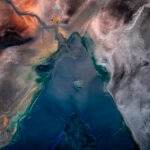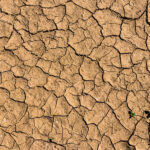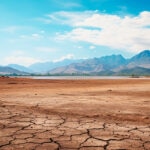BBVA sustainability papers: Three out of four people in the world will be affected by droughts by 2050, according to the United Nations
Droughts are abnormally dry periods, in which multiple factors are involved and which have important consequences for the environment and societies. An estimated 55 million people are directly affected by droughts every year, and they could harm as many as three out of four people worldwide by 2050, according to the UN. BBVA delves into this complex phenomenon in the new report 'Cuando falta el agua: claves para hacer frente a la sequía' (When water is scarce: keys to face drought).

When we talk about droughts, we usually refer to meteorological droughts, i.e., those caused by a deficit in rainfall. However, droughts can also be agricultural, when the amount of soil moisture does not meet crop demands, hydrological, when water supplies are below normal, or socioeconomic, when water shortages directly affect people.
What is drought?
According to the World Meteorological Organization (WMO), drought is a prolonged dry period within the natural climatic cycle that can occur anywhere in the world. This definition gives us two important insights to really understand drought: it is a natural occurrence and can take place anywhere on the planet.
Droughts existed before humans began the Industrial Revolution, started burning fossil fuels and filled the atmosphere with greenhouse gases (GHG). However, this is not to say that climate change has nothing to do with some of the droughts occurring today.
According to the UN, the number and duration of droughts has increased by 29% since 2000, with reference to the previous two decades. This trend is expected to continue, since, far from being reduced, greenhouse gas emissions that cause climate change continue to increase, and global warming is worsening accordingly. The average global temperature in 2022 was 1.15°C higher than the average values of the pre-industrial period (the Paris Agreement sets a target of no more than a 1.5°C rise to avoid the worst consequences of climate change).

What can be done to curb droughts?
It is not possible to prevent meteorological droughts, just as we cannot prevent water from falling from the sky when clouds threaten rain. What is possible, however, is to create conditions conducive to lessening their impacts.
"It's possible to prepare the world in the face of drought and above all to study in detail the different sectors to make them more resilient," explains Elena Lopez Gunn, founder and CEO of Icatalist, a Spanish startup specializing in sustainability and adaptability solutions in the face of climate change.
Some existing solutions seek to improve the adaptation of ecosystems and human societies to droughts. Other approaches focus on preventing these phenomena in a new scenario marked by climate change.
Recommendations and initiatives in the face of droughts
We can all help create more drought-resilient systems. On a personal level, there is much that can be done to both save water and reduce greenhouse emissions (and curb climate change, which worsens the consequences of droughts and makes them more frequent and intense).
These are some of the recommendations of the Spanish consumer and user organization (OCU) to reduce water use:
- Turn off faucets when water is not in use and replace baths with showers.
- Install flow restrictors and aerators on faucets and showerheads.
- Collect water in a bucket until it comes out hot and use it to water plants or mop the floor.
- Fix leaks promptly.
- Choose efficient washing machines and dishwashers, and do not use them until they are completely full.
- Water plants at night, to prevent water evaporation due to heat.
- Use drip irrigation systems instead of a hose.
- Call local municipal services if a leak is detected in the street.

These small gestures can make a big difference. The average Spanish consumer spends a total of 133 liters of water per day; of this, only two liters are for drinking. The remainder is used mainly for washing (36 %), toileting (32 %) and cooking (27 %).
Small and medium-sized companies also have a lot to contribute. In addition to putting the above tips into practice in their offices and workplaces, they can take other actions at the organizational level. These are some of them:
- Measure water usage and perform maintenance checks to ensure that equipment and facilities are functioning properly.
- Conduct campaigns to raise awareness, engage and inform employees.
- Focus on efficient technologies.
- Support projects with a real impact that are based on business finance.
- Invest only in environmentally friendly solutions.
Although it is very difficult to prevent droughts, it is possible to enhance the resilience of our systems to their consequences. Initiatives to achieve this range from fog-catchers in Lima to more efficient farming systems in Burkina Faso, from platforms to protect the Amazon to technology to advise farmers in the Mediterranean. They all share a common goal, to help improve our water management and protect nature.
BBVA has a Global Eco-efficiency Plan to reduce its environmental impact. Some of the measures implemented at its headquarters seek to limit consumption through gray water recycling systems, which are reused in toilets and bathrooms; rainwater capture systems, which are used for irrigation; and dry urinal systems, for example.
These and other measures have enabled the bank to reduce water consumption per employee by more than 12% since 2019 and to increase the use of recycled water by 57% in the last year, among other achievements.
Although it is very difficult to prevent droughts, it is possible to enhance the resilience of our systems to their consequences. Initiatives to achieve this range from fog-catchers in Lima to more efficient farming systems in Burkina Faso, from platforms to protect the Amazon to technology to advise farmers in the Mediterranean. They all share a common goal, to help improve our water management and protect nature.